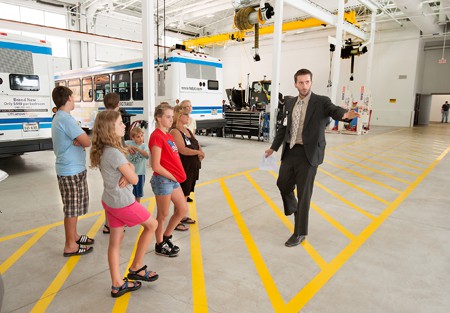HARRISONBURG, Va. — If it were a vehicle, the city buildings toured by up to 150 people during Friday’s open house would have that “new car smell.” But it’s not, so attendees had to go without the olfactory element as city officials showed off their new campus for the Department of Public Transportation.
The complex at 475 E. Washington St. includes an administration and operations building, a garage and a large parking lot. A vehicle fueling station with four pumps is under construction.
The entire project, which Department Director Reggie Smith said would cost about $17.5 million, is expected to be completed by Oct. 1.
Winchester’s Howard Shockey & Sons Inc. is the general contractor for the project, which was designed by the McLean office of RNL, a Denver-based firm.
Green Features
Avery Daugherty, the city’s transit superintendent, led a group of about 10 people on an early afternoon tour around the complex, highlighting comforts for drivers and other staffers and elements of the project that should save money or be environmentally friendly.
Both buildings feature LED photocell lights and take advantage of natural light as much as possible, he said, and the white walls in the garage help reflect the light. Special panes over the service bays also serve to refract light, spreading it around the garage.
“This helps give us the greatest amount of light without using much electricity,” Daugherty said.
Water is recycled for use in the garage’s wash bays, he said, and motor oil will be recycled to heat the building.
600 Vehicles Maintained, Full-Service Facility
Sharing also is a theme for the facility. Daugherty said transit staffers handle the city’s printing work, and other departments can use its conference rooms and training space.
The garage is a full-service facility, Smith said, maintaining all 600 vehicles — from school and transit buses to garbage trucks to cars and pickups — that comprise the city’s fleet. The value of those vehicles is $35 million.
Money for the project came from federal, state and city sources, he said. Bond proceeds were used to finance most of the project’s cost.
Source: Vic Bradshaw, Daily News Record

